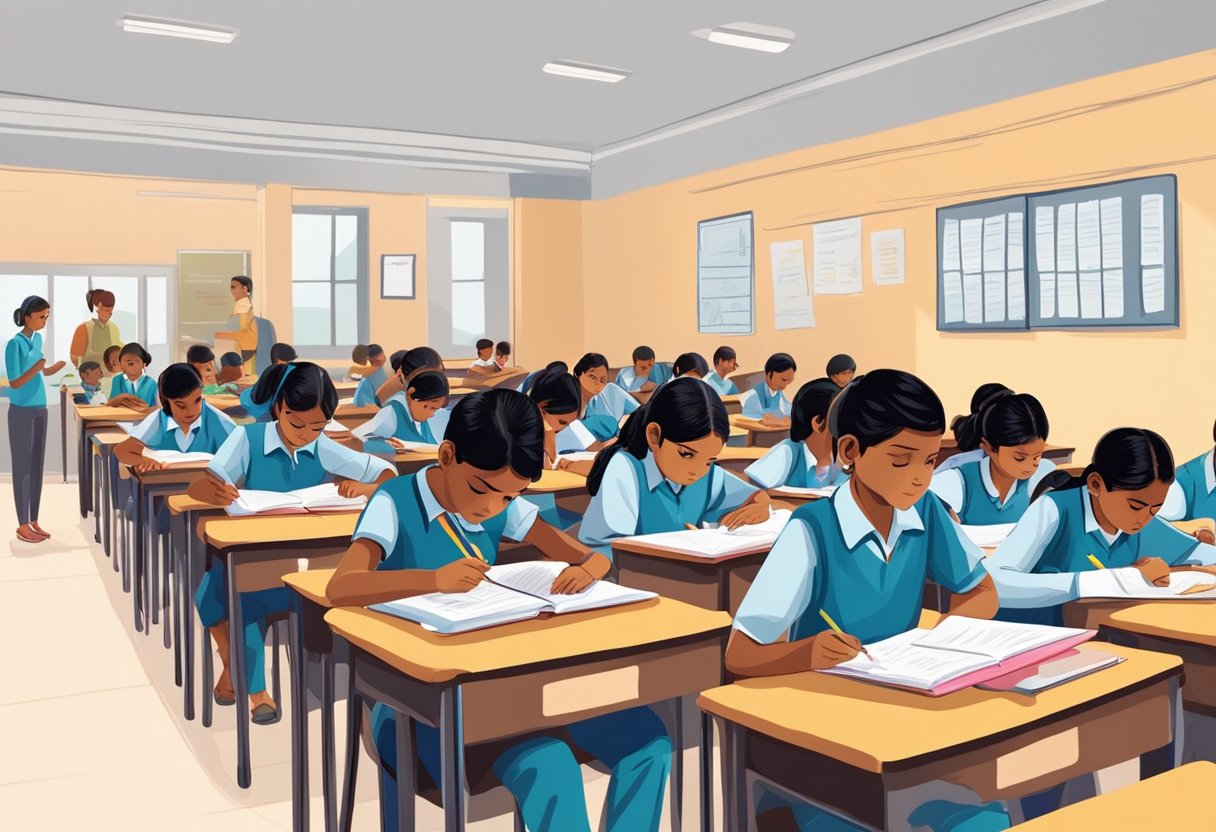GCE Ordinary Level in Sri Lanka 2023; The GCE Ordinary Level exam is a crucial milestone for every student in Sri Lanka. It is a standardized examination that tests the knowledge and skills of students in a range of subjects. The exam is conducted by the Department of Examinations, Sri Lanka, and is held annually.

The GCE Ordinary Level exam is a gateway to higher education and employment opportunities for students in Sri Lanka. It is a comprehensive examination that covers a wide range of subjects, including mathematics, science, languages, and social sciences. Students who pass the exam are eligible to pursue higher education in universities and vocational training institutes across the country.
Key Takeaways
- The GCE Ordinary Level exam is a standardized examination that tests the knowledge and skills of students in Sri Lanka.
- The exam covers a wide range of subjects, including mathematics, science, languages, and social sciences.
- Students who pass the exam are eligible to pursue higher education in universities and vocational training institutes across the country.
Overview of GCE Ordinary Level in Sri Lanka

Historical Context
The GCE Ordinary Level (O/L) is a General Certificate of Education qualification in Sri Lanka, conducted by the Department of Examinations of the Ministry of Education. The examination was first introduced in 1940 and has since become an important milestone for students in Sri Lanka. The O/L examination is usually taken by students at the end of their secondary education, after 11 years of schooling.
Over the years, the O/L examination has undergone several changes to keep up with the changing educational landscape in Sri Lanka. In 2015, the Ministry of Education introduced a new syllabus for the O/L examination, which was aimed at providing a more practical and skills-based education to students. The new syllabus also included a greater focus on vocational education, which was seen as a way to address the skills gap in the Sri Lankan economy.
Purpose and Significance
The O/L examination serves as a foundation for further education and future career opportunities for students in Sri Lanka. Students who pass the O/L examination are eligible to continue their studies at the Advanced Level (A/L) and eventually pursue higher education at universities or vocational training institutes.
The O/L examination is also significant because it is a prerequisite for many government jobs in Sri Lanka. In addition, many private sector employers also require job applicants to have passed the O/L examination. Therefore, the O/L examination is seen as a crucial step towards achieving career success in Sri Lanka.
In conclusion, the GCE Ordinary Level examination is an important educational milestone for students in Sri Lanka. The historical context and purpose of the examination demonstrate its significance in the Sri Lankan education system and the broader society.
Examination Structure
Subjects Offered
The GCE Ordinary Level (O/L) examination in Sri Lanka is designed to test the knowledge and skills of students in a variety of subjects. The examination consists of nine core subjects, which are compulsory for all students, and a range of elective subjects that students can choose from based on their interests and future career aspirations. The nine core subjects are:
- Buddhism
- Sinhala Language and Literature
- Mathematics
- Science
- English Language and Literature
- History
- Citizenship Education
- Health and Physical Education
- Tamil Language and Literature (for Tamil medium students)
In addition to the core subjects, students can choose up to three elective subjects from a range of options, including subjects such as Art, Music, Business Studies, and Information and Communication Technology.
Grading System
The GCE O/L examination is graded using a system of letters, ranging from A to F. Students who achieve grades A, B, or C are considered to have passed the examination, while those who achieve grades D, E, or F are considered to have failed. The grading system is designed to provide a clear indication of a student’s level of achievement in each subject.
Exam Schedule
The GCE O/L examination is typically held in December each year, with the results being released in March of the following year. The examination is divided into two sessions, with each session lasting for three hours. The first session is held in the morning, from 9:30 am to 12:00 pm, while the second session is held in the afternoon, from 1:30 pm to 4:00 pm. Students are required to sit for all of the core subjects, as well as any elective subjects that they have chosen. The examination schedule is designed to ensure that students have sufficient time to complete each subject and to provide a fair and consistent testing environment for all students.
Eligibility and Enrollment

Age Requirements
To be eligible to sit for the GCE Ordinary Level examination in Sri Lanka, a candidate must be at least 15 years of age on 1st January of the year of the examination. There is no upper age limit for candidates.
Registration Process
All candidates, including private candidates, must register for the examination online through the official website of the Department of Examinations, Sri Lanka. The online application period for the 2023/2024 GCE Ordinary Level examination is from 23rd January 2024 to 15th February 2024.
To register, candidates must provide their personal details, including their name, date of birth, and National Identity Card number. They must also select the subjects they wish to sit for and indicate their preferred examination center.
Candidates who are sitting for the examination through a school must register through their school authorities. The school authorities will then register the candidates online through the official website of the Department of Examinations, Sri Lanka.
It is important to note that candidates who fail to register during the specified period will not be allowed to sit for the examination. Additionally, candidates who provide false information during the registration process may face penalties, including disqualification from the examination.
Curriculum and Learning Materials

Subject Syllabi
The GCE Ordinary Level (OL) examination in Sri Lanka covers nine subjects. The syllabi for these subjects are set by the Department of Examinations of the Ministry of Education. Each subject has a specific syllabus that outlines the topics and knowledge areas that students are expected to master. The syllabi are regularly updated to ensure that they remain relevant and up-to-date with the latest developments in the respective fields.
Recommended Textbooks
To help students prepare for the GCE OL examination, the Ministry of Education recommends a list of textbooks for each subject. These textbooks are carefully selected to ensure that they cover all the topics and knowledge areas included in the syllabi. The textbooks are written by experts in the respective fields and are regularly updated to reflect the latest developments.
Supplementary Resources
In addition to the recommended textbooks, there are a variety of supplementary resources available to help students prepare for the GCE OL examination. These resources include study guides, past papers, and online resources such as videos and interactive quizzes. Students are encouraged to use these resources to supplement their learning and to reinforce their understanding of the topics and knowledge areas covered in the syllabi.
Examination Preparation
Preparing for the GCE Ordinary Level examination in Sri Lanka can be challenging, but with the right approach, students can achieve success. Here are some study tips and resources to help students prepare for the exam.
Study Tips
- Create a study schedule: Students should create a study schedule that includes all the subjects they need to cover before the exam. They should allocate enough time for each subject and prioritize the ones they find difficult.
- Practice past papers: Practicing past papers can help students get familiar with the exam format and the types of questions that are asked. It can also help them identify their strengths and weaknesses.
- Take breaks: Studying for long hours without taking breaks can be counterproductive. Students should take breaks to rest their minds and recharge.
- Stay organized: Students should keep their notes and study materials organized and in one place. This can help them save time and reduce stress when they need to revise.
Tutoring and Support
- Online resources: There are many online resources available that can help students prepare for the exam. These include websites, YouTube channels, and online forums where students can find study materials, practice papers, and advice.
- Tutoring: Students who need extra help can consider hiring a tutor. Tutors can provide personalized attention and help students understand difficult concepts.
- Study groups: Studying with peers in a group can be helpful for some students. It can provide a supportive environment where they can exchange ideas and learn from each other.
By following these study tips and utilizing available resources, students can prepare effectively for the GCE Ordinary Level examination in Sri Lanka 2023/2024.
Exam Day Guidelines
Identification Requirements
On the day of the GCE Ordinary Level (O/L) examination, candidates are required to bring their admission card and a valid form of identification. The accepted forms of identification are national identity cards, passports, and driver’s licenses. The identification must be valid, and the name and photograph on the identification must match the name and photograph on the admission card.
Test Center Regulations
Candidates are advised to arrive at the test center at least 30 minutes before the scheduled start time of the examination. Latecomers will not be allowed to enter the examination hall after the examination has started. Candidates are not allowed to bring any electronic devices, including mobile phones, smartwatches, or calculators, into the examination hall. Candidates are also not allowed to bring any study materials, including textbooks, notes, or formula sheets, into the examination hall.
During the examination, candidates must sit in the assigned seat and may not communicate with other candidates. Any form of cheating or misconduct will result in disqualification from the examination. Candidates must follow the instructions of the invigilators and may not leave the examination hall before the end of the examination without permission.
In conclusion, candidates must ensure that they have all the necessary identification and follow the test center regulations to avoid any issues on the day of the examination.
Results and Certification
Results Release Process
The GCE Ordinary Level (O/L) examination results for the year 2023/2024 will be released by the Department of Examinations, Sri Lanka. The exact date of release is yet to be announced, but it is expected to be in March 2024. The Department of Examinations will publish the results on its official website doenets.lk.
Students can check their results by visiting the website and entering their index number. In addition, schools will also receive a copy of the results, which will be made available to students. The results will show the grades received by the students in each subject, as well as the overall grade.
Certification and Recognition
After the results are released, students who have passed the examination will receive a certificate from the Department of Examinations. The certificate will indicate the grades received by the student in each subject, as well as the overall grade. The certificate will also include the student’s name, index number, and the date of birth.
The GCE O/L examination is widely recognized in Sri Lanka and is considered an important qualification for further education and employment. Students who pass the examination can continue their education by enrolling in GCE Advanced Level (A/L) courses or vocational training programs. In addition, the certificate is recognized by many employers and can be used to secure employment in various fields.
Overall, the GCE O/L examination is an important milestone in the academic and professional careers of Sri Lankan students. With proper preparation and hard work, students can achieve excellent results and pave the way for a bright future.
Post-Examination Opportunities
After taking the GCE Ordinary Level examination in Sri Lanka, students have several opportunities for further education and employment. Here are some of the most common paths that students take after completing the exam.
Further Education Paths
Students who pass the GCE Ordinary Level exam can choose to pursue further education in a variety of fields. One popular option is to continue studying for the GCE Advanced Level exam, which is a prerequisite for entry into most universities in Sri Lanka. Students who pass the GCE Advanced Level exam can then apply for undergraduate programs in fields such as medicine, engineering, law, and business.
Another option for further education is vocational training. Sri Lanka offers a range of vocational training programs in fields such as hospitality, construction, and information technology. These programs can lead to certifications or diplomas that can help students enter the workforce with specialized skills.
Employment Prospects
Students who pass the GCE Ordinary Level exam can also choose to enter the workforce directly. While the job market in Sri Lanka can be competitive, there are opportunities available for those with the right skills and qualifications.
Some of the most in-demand jobs in Sri Lanka include those in the fields of information technology, finance, and healthcare. Students who have completed vocational training programs may also be able to find work in fields such as hospitality, construction, and automotive repair.
Overall, students who pass the GCE Ordinary Level exam have a range of options available to them for further education and employment. By carefully considering their interests and goals, students can choose the path that is right for them and set themselves up for success in the future.
Frequently Asked Questions
When will the GCE Ordinary Level 2023/2024 results be released in Sri Lanka?
The GCE Ordinary Level 2023/2024 results are expected to be released in late March or early April 2024. The exact date of the release will be announced by the Department of Examinations, Sri Lanka.
How can I download the GCE Ordinary Level 2023/2024 syllabus for Sri Lanka?
The GCE Ordinary Level 2023/2024 syllabus for Sri Lanka can be downloaded from the official website of the Department of Examinations, Sri Lanka at onlineexams.gov.lk.
What are the examination dates for the GCE Ordinary Level in Sri Lanka for the academic year 2023/2024?
The examination dates for the GCE Ordinary Level in Sri Lanka for the academic year 2023/2024 have not been officially announced yet. However, the exams are usually held in December each year.
What subjects are included in the GCE Ordinary Level syllabus for the 2023/2024 session in Sri Lanka?
The GCE Ordinary Level syllabus for the 2023/2024 session in Sri Lanka includes subjects such as Mathematics, Science, History, English, Sinhala, Tamil, and more. The full list of subjects can be found on the official website of the Department of Examinations, Sri Lanka.
How can students access their GCE Ordinary Level 2023/2024 exam results?
Students can access their GCE Ordinary Level 2023/2024 exam results by visiting the official website of the Department of Examinations, Sri Lanka at doenets.lk and entering their index number.
What is the minimum passing grade for the GCE Ordinary Level exams in Sri Lanka?
The minimum passing grade for the GCE Ordinary Level exams in Sri Lanka is a C grade. However, students who wish to pursue higher education are advised to aim for higher grades.
Also Read: